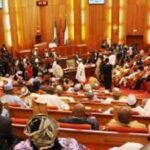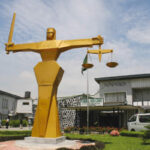*loyalists fight back
By Our Reporter
An alleged bribery scandal rocking the ad hoc committee set up by the leadership of the House of Representatives to investigate Nigeria’s petroleum downstream sector allegedly forced House Speaker, Tajudeen Abbas to disband the committee, The Authority can report.
However, loyalists of the very influential Deputy Speaker, Hon. Benjamin Kalu, are reportedly miffed by the Speaker’s action and, according to House sources, are fighting back. Legislative sources told The Authority that many loyalists of the Deputy Speaker considered the unilateral disbandment of the panel by the Speaker as a humiliation of the second highest ranking officer in the House.
In a surprise move, the House leadership on Monday announced the dissolution of the ad hoc committee. According to House spokesman, Hon. Akin Rotimi, the sack was to “ensure the efficacy and independence of this investigation.”
A new committee, said the spokesman, would be constituted and “will consist of honourable members selected for their expertise, competence, and integrity,” lending credence to the allegation that some members of the disbanded committee lacked competence and integrity.
Hardly had the dust of the disbandment settled than 23 Civil Society Organisations (CSOs) petitioned the Speaker, calling for the probe of the House Committee on petroleum resources (Downstream), particularly the suspension of the committee’s chairman, Hon. Ikenga Ugochinyere.
In the petition dated August 5, 2024, the CSOs accused the committee members of alleged corruption, extortion, blackmail, and sponsoring faceless groups and media attacks.
They claimed that the lawmakers allegedly demanded a payment of ten million dollars under the threat of calling for the dismissal of Mr. Farouk Ahmed, CEO of the Nigerian Midstream and Downstream Petroleum Regulatory Authority (NMDPRA), and Mr. Mele Kyari, Group CEO of the Nigerian National Petroleum Corporation Limited (NNPCL).
Describing the alleged behaviour as unethical, the CSOs urged the Inspector General of Police to investigate these allegations and hold the responsible lawmakers accountable.
“We implore the Inspector General of Police to launch an investigation into this allegation and expose the lawmakers (allegedly) involved so they can be brought to justice,” Such actions undermine the integrity of the House of Representatives and tarnish the image of our legislative body. It is imperative that these allegations are thoroughly investigated,” they stated.
The group urged the Speaker to reshuffle the Joint Committee Panel on Petroleum Resources to ensure a fair and unbiased investigation into the activities of the concerned lawmakers.
Sources close to the House leadership told The Authority that the Speaker had been inundated with complaints of how some members of the committee had been blackmailing top officials in the downstream sector of the petroleum industry, but that the deputy Speaker had urged the Speaker to dismiss the complaints.
According to the sources, it was on the basis of the reports that, on Sunday, Speaker Abbas conveyed a meeting of principal officers of the House. Deputy speaker Kalu reportedly wasn’t in Abuja, so joined via zoom.
“It was during the meeting that it became clear that the deputy speaker was sympathetic to some members of the ad hoc committee believed to be soiling the name of the House. At a point, he allegedly engaged the Speaker in a shouting march, forgetting that the Speaker is the co-chairman of the National Assembly and chairman of the House selection committee,” offered one of the sources. “It was at this point that the Speaker decided to shock his deputy with the disbandment, ” he added.
The Authority further gathered that lawmakers opposed to the style of one of their colleagues tasked with the responsibility of probing the downstream sector, are appealing to the Speaker to stand his ground on the dissolution, drawing attention to what they described as over-pampering the lawmaker.
The disbanded panel was mandated to investigate the importation of adulterated petroleum products, the non-availability of crude oil for domestic refineries, and other critical energy security issues.
However, since it’s inauguration, the committee has been embroiled in several controversies, particularly regarding the investigation of the impasse between the Dangote Refinery and the Nigerian Midstream and Downstream Regulatory Authority (NMDRA).



